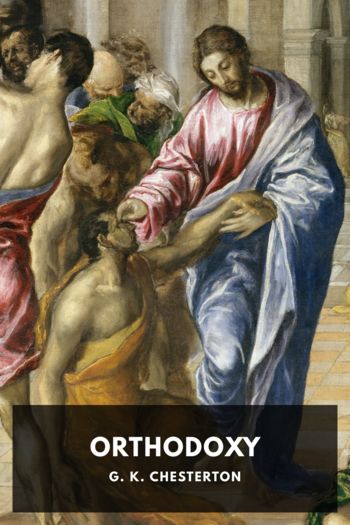Heretics by G. K. Chesterton (best way to read e books TXT) 📕

- Author: G. K. Chesterton
Book online «Heretics by G. K. Chesterton (best way to read e books TXT) 📕». Author G. K. Chesterton
My objection to Mr. Lowes Dickinson and the reassertors of the pagan ideal is, then, this. I accuse them of ignoring definite human discoveries in the moral world, discoveries as definite, though not as material, as the discovery of the circulation of the blood. We cannot go back to an ideal of reason and sanity. For mankind has discovered that reason does not lead to sanity. We cannot go back to an ideal of pride and enjoyment. For mankind has discovered that pride does not lead to enjoyment. I do not know by what extraordinary mental accident modern writers so constantly connect the idea of progress with the idea of independent thinking. Progress is obviously the antithesis of independent thinking. For under independent or individualistic thinking, every man starts at the beginning, and goes, in all probability, just as far as his father before him. But if there really be anything of the nature of progress, it must mean, above all things, the careful study and assumption of the whole of the past. I accuse Mr. Lowes Dickinson and his school of reaction in the only real sense. If he likes, let him ignore these great historic mysteries—the mystery of charity, the mystery of chivalry, the mystery of faith. If he likes, let him ignore the plough or the printing-press. But if we do revive and pursue the pagan ideal of a simple and rational self-completion we shall end—where Paganism ended. I do not mean that we shall end in destruction. I mean that we shall end in Christianity.
XIII Celts and CeltophilesScience in the modern world has many uses; its chief use, however, is to provide long words to cover the errors of the rich. The word “kleptomania” is a vulgar example of what I mean. It is on a par with that strange theory, always advanced when a wealthy or prominent person is in the dock, that exposure is more of a punishment for the rich than for the poor. Of course, the very reverse is the truth. Exposure is more of a punishment for the poor than for the rich. The richer a man is the easier it is for him to be a tramp. The richer a man is the easier it is for him to be popular and generally respected in the Cannibal Islands. But the poorer a man is the more likely it is that he will have to use his past life whenever he wants to get a bed for the night. Honour is a luxury for aristocrats, but it is a necessity for hall-porters. This is a secondary matter, but it is an example of the general proposition I offer—the proposition that an enormous amount of modern ingenuity is expended on finding defences for the indefensible conduct of the powerful. As I have said above, these defences generally exhibit themselves most emphatically in the form of appeals to physical science. And of all the forms in which science, or pseudoscience, has come to the rescue of the rich and stupid, there is none so singular as the singular invention of





Comments (0)